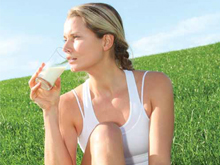Health Topics
-
Healthy Living
-
|
|
July 2011
|
| Dietary Advice for Sports Persons |
| Ishi Khosla |
| |
 |
As we all know, to be able to play sports, optimum health is a must. Here are a few tips and a short diet plan to help all our aspiring athletes. |
- Balanced diet providing adequate fuel for training and recovery, with a good mix of essential nutrients including adequate intake of macro (proteins, carbohydrates & fats) and micro (vitamins & minerals) nutrients is essential for a good performance.
- Rich sources of protein in the diet help you get all the essential amino acids (building blocks of protein) for the muscles to keep out of catabolism. On eating excessive amounts of protein,the extra calories will simply be stored (as fat) or burned. It can also lead to over-straining of the kidneys and long-term metabolic problems. For this reason, athletes should be advised to select sources of high protein foods that contain low amounts of fat, such as skimmed milk, low fat yoghurt, lean meats, fish and poultry, beans, legumes and egg whites.
- Quality and quantity of fat intake is equally important in maintaining a good nutritional status and effective performance. Try and get CLAs (Conjugated Linolenic acid) and EFAs (Essential fatty acids). CLAs can be obtained from dairy and cheese and essential fatty acids can be obtained from fish, seeds and nuts. CLAs help in building lean body mass. EFAs especially the n-3 fats (omega-3 fats found in fish) will prevent inflammation and muscle soreness.
- Adequate carbohydrate intake to meet daily fuel requirements is a key strategy to protect immune function following prolonged strenuous exercise. Carbohydrates included in the diet should be of low glycemic index (glycemic index refers to the extent of rise in blood sugar in response to a food in comparison with the response to an equivalent amount of glucose), which improve performance and reduce the risk of hypoglycemia.
- Hydration is critical during and after the exercise sessions. Dehydration has been known to induce stress on the body as well as increase neuro-endocrine hormones that can result in depression of the immune system.
- Despite the heavy reliance of athletes on nutritional supplements, there is currently a lack of evidence to support benefits from high doses of antioxidants, vitamins, or other supplements like glutamine, echinacea in preventing exercise-induced immune suppression and providing protection from infection. Include nutritional supplements, but only under the supervision of a qualified physician.
Current opinion is that athletes should invest in nutrient-rich foods and fluids that provide energy, a wide range of vitamins, minerals and other important substances, such as phyto-chemicals, found naturally in foods.
- 7-9 servings of fruit and vegetables
- 3 servings of milk/curd/paneer
- 3 servings chicken/fish/lean meat
- 2-3 servings pulses and legumes
- Handful of nuts
- Cereals, potatoes, starches and sugar- as per calorie requirements
- Salt in moderation
- Limited alcohol consumption
|
|
Diet Advice
Early Morning:Green tea
Aloe Vera gel (50 ml) + Lemonade (1 glass)
Breakfast: Milk shake + Baked beans + Toast (2) OR
Oats / Barley porridge with milk + Fruit (1-2)
Mid Morning: Fresh vegetable juice
Toasted almonds & cashews
Lunch: Stuffed roti +Vegetables + Yoghurt OR
Brown rice vegetable pulao + Pulses+ Yoghurt
Evening: Coconut water/ Lemonade/ Tea
Roasted chana (1/2 cup)/ Multigrain bhel /Soy upma/ Muffins/ Cookie/ Fruit
Dinner: Salad + Raita/ Yoghurt (1 large bowl) + Vegs. (Plenty)+ Cheela (daal/besan) OR Fresh vegetable soup + Chicken/Fish/Tofu (100g) + Stir fried vegetables + Noodles |
 |
Ishi Khosla is a Clinical Nutritionist and Director - Whole Foods India |
|
|
|